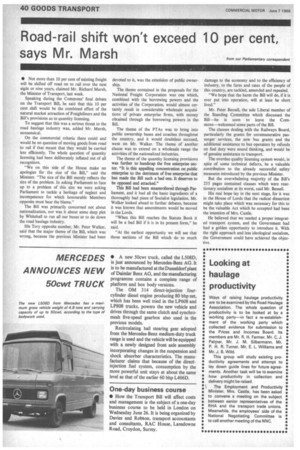Road-rail shift won't exceed 10 per cent,
Page 42

If you've noticed an error in this article please click here to report it so we can fix it.
says Mr. Marsh from our Parliamentary correspondent
• Not more than 10 per cent of existing freight will be shifted off road on to rail over the next eight or nine years, claimed Mr. Richard Marsh, the Minister of Transport, last week.
Speaking during the Commons' final debate on the Transport Bill, he said that this 10 per cent shift would be the combined effect of the natural market attraction of Freightliners and the Bill's provisions as to quantity licensing.
To suggest that this was a serious threat to the road haulage industry was, added Mr. Marsh, nonsensical.
On the commercial criteria there could and would be no question of moving goods from road to rail if that meant that they would be carried less efficiently. The whole question of quantity licensing had been deliberately inflated out of all recognition.
"We on this side of the House make no apologies for the size of the Bill," said the Minister. "The size of the Bill merely reflects the size of the problem. In asking Parliament to face up to a problem of this size we were asking Parliament to tackle a heritage of neglect and incompetence for which honourable Members opposite must bear the blame."
The Bill was primarily concerned not about nationalization, nor was it about some deep plot by Whitehall to run all our buses or to do down the road haulage industry.
His Tory opposite number, Mr. Peter Walker, said that the major theme of the Bill, which was wrong, because the previous Minister had been devoted to it, was the extension of public ownership.
The theme contained in the proposals for the National Freight Corporation was one which, combined with the borrowing powers and the activities of the Corporation, would almost certainly result in considerable wholesale acquisitions of private enterprise firms, with money obtained through the borrowing powers in the Bill.
The theme of the PTAs was to bring into public ownership buses and coaches throughout the country, and it would doubtless succeed, went on Mr. Walker. The theme of another clause was to extend on a wholesale range the activities of the nationalized industries.
The theme of the quantity licensing provisions was further to handicap the free enterprise sector. "It is this appalling concentration on public enterprise to the detriment of free enterprise that has made the Bill such a bad one. It deserves to be opposed and attacked."
This Bill had been steamrollered through Parliament, and it had all the basic ingredients of a thoroughly bad piece of Socialist legislation. Mr. Walker looked ahead to further debates, because it was known that amendments would be moved in the Lords.
"When this Bill reaches the Statute Book it Will be a bad Bill if it is in its present form," he said.
"At the earliest opportunity we will see that those sections of the Bill which do so much damage to' the economy and to the efficiency of industry, to the fares and rates of the people of this country, are tackled, amended and repealed.
"We hope that the harm the Bill will do, if it is ever put into operation, will at least be short lived."
Mr. Peter Bessell, the sole Liberal member of the Standing Committee which discussed the Bill—he is soon to leave the Commons—welcomed some parts of the Bill.
The clauses dealing with the Railways Board, particularly the grants for unremunerative passenger services, the new bus grants and the additional assistance to bus operators by refunds on fuel duty were sound thinking, and would be of genuine assistance to transport.
The overdue quality licensing system would, in spite of some technical defects, be a valuable contribution to the already successful safety measures introduced by the previous Minister.
But the overwhelming majority of the Bill's 255 pages contained clauses which were reactionary socialism at its worst, said Mr. Bessell.
His real hope lay in the next stage, for it was in the House of Lords that the radical dissection might take place which was necessary for this to be the valuable Act which he accepted had been the intention of Mrs. Castle.
He believed that we needed a proper integrated transport system, and the Government had had a golden opportunity to introduce it. With the right approach and less ideological socialism, the Government could have achieved the objective.
















































































































































